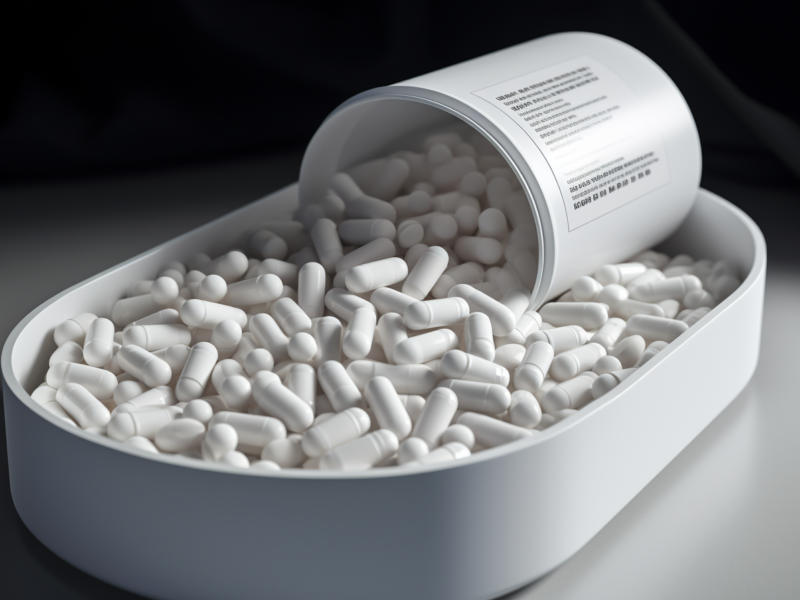GABA, short for gamma-aminobutyric acid, is a neurotransmitter that plays a crucial role in maintaining mental health and well-being. The intricate relationship between GABA and various aspects of our mood has been the focus of extensive research in recent years. In this article, we delve into the impact of GABA on mood regulation and overall psychological well-being. By understanding the mechanisms through which GABA influences mental health, we can gain insights into potential therapeutic interventions and lifestyle modifications that could enhance our emotional state and foster improved quality of life. Join us as we explore the fascinating connection between GABA levels and mental wellness.
The Role of GABA in Mood Regulation
GABA, or gamma-aminobutyric acid, is a neurotransmitter that plays a critical role in the regulation of mood and overall mental health. Extensive research has focused on understanding the intricate relationship between GABA and various aspects of our emotional state.

By unraveling the mechanisms through which GABA influences mood, we can gain valuable insights into potential therapeutic interventions and lifestyle changes that could enhance our psychological well-being.
The impact of GABA on mood regulation cannot be understated. It acts as an inhibitory neurotransmitter in the brain, slowing down neural activity and promoting relaxation.
Low levels of GABA have been associated with anxiety disorders, depression, and other mood-related conditions.
On the other hand, increasing GABA levels through pharmacological means or natural approaches like yoga or meditation has shown promising results in reducing feelings of stress and anxiety while improving overall emotional stability.
Considering its crucial role in maintaining mental health and well-being, understanding how to support healthy GABA functioning becomes essential for optimal psychological functioning. Through further investigation into this neurotransmitter’s complex influence on mood regulation, new avenues for treatment options may emerge that could provide relief to individuals experiencing various mental health challenges.
GABA Deficiency and its Effects on Mental Health
GABA deficiency refers to a condition characterized by insufficient levels of gamma-aminobutyric acid in the brain. This neurotransmitter is responsible for inhibiting certain neuronal activities and promoting relaxation, ultimately contributing to mental equilibrium. When GABA levels are inadequate, it can lead to various mental health issues such as anxiety disorders, depression, and insomnia. Research suggests that GABA deficiency may disrupt the delicate balance between excitatory and inhibitory neurotransmitters in the brain, potentially causing an imbalance that negatively impacts overall mood and well-being.
The effects of GABA deficiency on mental health are significant. Low levels of GABA have been linked to increased anxiety symptoms, including restlessness, irrational feelings of fear or worry, and panic attacks. Additionally, individuals with GABA deficiency may experience difficulty sleeping or have disrupted sleep patterns due to heightened arousal. Studies also indicate a correlation between low GABA levels and depression-related symptoms such as fatigue, low energy levels, decreased motivation, and problems with concentration or cognition. It’s important to note that proper diagnosis by a healthcare professional is crucial for determining if an individual has a specific GABA deficiency and exploring appropriate treatment options tailored to their needs.
GABAergic Medications for Mood Disorders
GABAergic medications are a class of drugs that target the neurotransmitter gamma-aminobutyric acid (GABA) to alleviate symptoms of mood disorders. GABA acts as an inhibitory neurotransmitter in the brain, regulating neuronal activity and promoting feelings of relaxation and calmness. By enhancing GABA transmission, these medications help to stabilize mood and reduce anxiety and depression.
Research has shown that imbalances in GABA levels are associated with various mood disorders such as anxiety, depression, and bipolar disorder. Consequently, GABAergic medications have emerged as effective treatments for these conditions. They work by increasing the availability or mimicking the effects of GABA in the brain, thereby restoring balance and alleviating symptoms.
While these medications can provide relief for individuals suffering from mood disorders, it is important to note that they should be used under medical supervision due to potential side effects and interactions with other drugs. Additionally, lifestyle modifications such as stress management techniques and regular exercise can also support natural GABA production in the brain, complementing the effects of medication for overall mental health improvement.
Lifestyle Modifications to Boost GABA Levels
Lifestyle modifications can effectively boost GABA levels and improve mental health. One crucial lifestyle factor is the practice of regular exercise, which has been shown to increase GABA production in the brain. Engaging in activities such as aerobic exercises, yoga, and meditation can stimulate the release of GABA and promote a more balanced mood.
 Another essential lifestyle modification is dietary changes that support adequate GABA levels. Consuming foods rich in nutrients like vitamin B6, magnesium, zinc, and L-theanine can enhance the synthesis and function of GABA in the brain.
Another essential lifestyle modification is dietary changes that support adequate GABA levels. Consuming foods rich in nutrients like vitamin B6, magnesium, zinc, and L-theanine can enhance the synthesis and function of GABA in the brain.
These include bananas, leafy greens, whole grains, nuts, seeds, and green tea.
Furthermore, adopting stress-reducing techniques can positively impact GABA levels. Chronic stress suppresses GABA activity; therefore practicing stress management techniques like deep breathing exercises or engaging in hobbies that bring joy and relaxation can help regulate mood by boosting natural GABA production.
Overall, embracing an active lifestyle with regular exercise routines combined with a diet rich in specific nutrients while managing stress effectively are key factors for enhancing GABA levels naturally and promoting better mental health outcomes.
GABA and Anxiety: Alleviating Stress and Promoting Calm
GABA, or gamma-aminobutyric acid, is a neurotransmitter that is essential for promoting calm and alleviating stress. Research has shown that GABA acts as an inhibitory neurotransmitter in the brain, which means it helps to reduce neural activity and promote relaxation. Low levels of GABA have been linked to anxiety disorders, as it plays a crucial role in regulating the excitability of neurons.
Studies have demonstrated the effectiveness of increasing GABA levels in reducing anxiety symptoms. Medications known as benzodiazepines, such as Valium and Xanax, work by enhancing the effects of GABA in the brain. These medications can help individuals feel calmer and more relaxed.
In addition to pharmaceutical interventions, lifestyle modifications can also increase GABA production naturally. Regular exercise has been shown to boost GABA levels in the brain, leading to improved mood and reduced anxiety. Engaging in activities such as yoga or meditation can also be beneficial, as they promote a sense of calmness and tranquility by increasing GABA production.
Overall, understanding the role of GABA in mental health provides valuable insights into potential therapeutic approaches for managing anxiety and improving overall well-being. By exploring both pharmacological options and lifestyle modifications that enhance GABA function, individuals can take proactive steps towards achieving emotional balance and better quality of life.

GABA and Depression: Enhancing Mood and Emotional Resilience
GABA, or gamma-aminobutyric acid, is a neurotransmitter that has been heavily studied in relation to its impact on mental health and emotional well-being. Research has shown that GABA plays a crucial role in mood regulation and overall psychological resilience. It acts as an inhibitory neurotransmitter, helping to reduce excessive neuronal activity and promote feelings of relaxation and calmness.
Studies have found that individuals with depression often have lower levels of GABA in their brain or impaired GABA function. This suggests that enhancing GABA activity may be beneficial for treating depressive symptoms. Various therapeutic interventions have been explored to target the GABA system, such as medications that increase GABA availability or supplements designed to support healthy GABA levels.
Understanding the intricate relationship between GABA and depression can provide valuable insights into potential treatment options for improving mood and emotional well-being. By targeting the underlying mechanisms through which GABA influences mental health, researchers hope to develop more effective interventions for those struggling with depression.
GABA and Sleep: Improving Sleep Quality and Mental Well-Being
GABA, or gamma-aminobutyric acid, is a neurotransmitter that has been found to have a significant impact on sleep quality and mental well-being. Research has shown that GABA helps regulate the brain’s excitatory activity and promotes relaxation, making it an important factor in promoting healthy sleep patterns. By increasing GABA levels in the brain, individuals may experience improved sleep duration and overall sleep quality.
In addition to its role in sleep regulation, GABA also plays a crucial role in maintaining mental health and well-being. Imbalances in GABA levels have been linked to various mood disorders such as anxiety and depression. Low levels of GABA have been associated with increased stress response and difficulty managing negative emotions. On the other hand, higher levels of this neurotransmitter are believed to promote feelings of calmness and contentment.
Understanding the intricate relationship between GABA and mental health can provide valuable insights into potential therapeutic interventions or lifestyle modifications for enhancing emotional well-being. Further research on how to optimize GABA function could lead to innovative treatments for mood disorders while also highlighting the importance of prioritizing healthy sleeping habits for maintaining overall psychological wellness.
In Closing:
Gamma-aminobutyric acid (GABA), a naturally occurring amino acid and the main inhibitory neurotransmitter in the nervous system, plays a significant role in mental health, particularly in mood and well-being. Various studies highlight GABA’s importance in reducing excitatory neurotransmitter activity and promoting calm and relaxation. One study demonstrated an increase in GABA levels leading to improved mood and decreased anxiety when participants engaged in certain activities 3 times a week for 12 weeks.

Moreover, low GABA activity is linked to several health conditions, including mood and anxiety disorders. Higher GABA levels may contribute to enhanced cognitive function and better overall mental status.
GABA blocks nerve cells in the brain, which may affect excitatory neurotransmitter activity and reduce symptoms of anxiety and high blood pressure in people.
GABA supplements are available for those who need to boost their natural GABA production. These are often used to treat conditions such as seizures or to manage health conditions like high blood pressure.
However, it’s essential to consult with a healthcare provider before starting any new supplement regimen. Dosages, often around milligrams of GABA, should be carefully monitored and adjusted according to individual needs and responses.
Interestingly, GABA can also play a role in treating more serious conditions such as hepatic encephalopathy. Its application in such cases further emphasizes the crucial role it plays in our brain function and overall well-being. The potential of GABA to enhance our mental health continues to generate intriguing and promising health news.
Common Questions:
Q: What is GABA and how does it impact mental health?
A: GABA, or gamma-aminobutyric acid, is a neurotransmitter in the central nervous system that plays a role in regulating mood and anxiety. It is the main inhibitory neurotransmitter in the brain, meaning it helps calm down excessive neuronal activity. GABA has been associated with improved mood, reduced feelings of anxiety, and overall well-being.
Q: How does GABA work in the brain?
A: GABA works by binding to GABA receptors in the brain, specifically GABA-A receptors. This binding inhibits or reduces the amount of neurotransmitters like glutamate, which is involved in excitatory processes. By reducing excessive neuronal activity, GABA helps promote a sense of calmness and relaxation.
Q: Can taking GABA supplements increase the amount of GABA in your brain?
A: While GABA supplements are available, studies have shown that orally consumed GABA does not significantly increase brain GABA levels. This is because GABA has difficulty crossing the blood-brain barrier. Therefore, the effectiveness of oral GABA supplements in directly increasing brain GABA levels is still being researched.
Q: Does GABA play a role in the production of serotonin?
A: Yes, GABA has been found to modulate the production and release of serotonin, which is another important neurotransmitter involved in mood regulation. By regulating serotonin levels, GABA can indirectly impact mood and well-being.
Q: Is GABA a natural substance produced by the body?
A: Yes, GABA is a natural substance produced by the body. It is synthesized from glutamate, another neurotransmitter, through a process called decarboxylation. GABA is also found naturally in certain foods, such as fermented products.
Q: Can GABA supplements help with anxiety?
A: Some research suggests that GABA supplements may help reduce feelings of anxiety. However, the evidence is still limited, and more studies are needed to determine the effectiveness of GABA supplements in treating anxiety disorders. If you are experiencing anxiety, it is recommended to talk to your healthcare provider for appropriate treatment options.
Q: Are there any risks or side effects associated with using GABA?
A: Generally, GABA is considered safe for most people when taken in appropriate doses. However, some individuals may experience mild side effects such as drowsiness, headache, or gastrointestinal discomfort. It is always advisable to talk to your doctor or healthcare provider before starting any new supplement or medication.
Q: Can GABA be used to treat high blood pressure?
A: While GABA has been studied for its potential benefits in reducing blood pressure, more research is needed to establish its effectiveness and safety for this purpose. It is important to consult with your healthcare provider for appropriate management of high blood pressure.
Q: Can GABA supplements interact with medications?
A: GABA supplements may potentially interact with certain medications, such as benzodiazepines or barbiturates, that also affect GABA receptors. Therefore, it is crucial to inform your healthcare provider about all the medications and supplements you are taking to avoid any possible interactions.
Q: Is GABA recommended for people with hepatic encephalopathy?
A: People with hepatic encephalopathy, a condition associated with liver dysfunction, should consult with their healthcare provider before taking GABA supplements. GABA may interact with the medications used to manage hepatic encephalopathy, and individual circumstances should be taken into consideration.



 Seeking Professional Guidance About GABA Supplements
Seeking Professional Guidance About GABA Supplements
